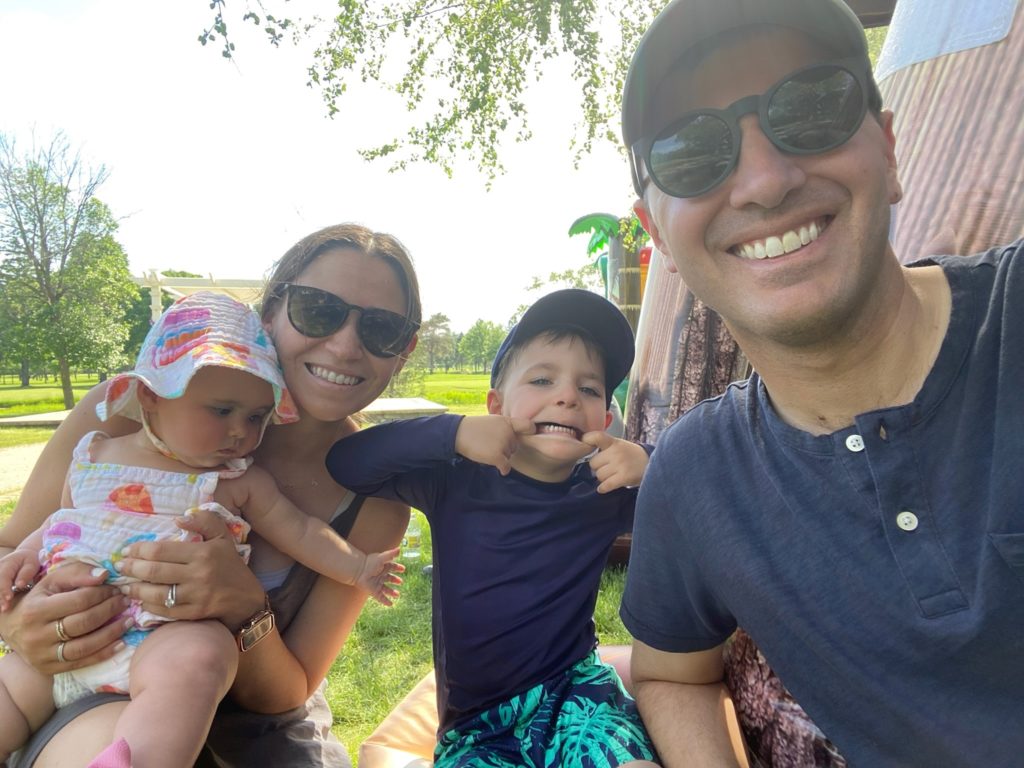
To build upon the great articles written by my colleagues over the past several months, I am pleased to share a little about how I manage my own money.
As we do with our clients, for starters, it is worth discussing some of the goals that drive my investment decisions. While I don’t believe one needs a specific set of goals to justify saving and investing, saving and investing for their own sake is always a good idea. But there are a few general objectives that I like to keep front and center.
First, I want my family to not have to worry about money. No amount of money will ensure happiness or great life experiences, but having financial security certainly eliminates a lot of problems. This is the primary reason I am driven to work hard, save and invest well.
Furthermore, I ascribe a tremendous amount of value to having flexibility with my time and thoughts. Again, money alone won’t solve this, but anyone who understands compound interest knows how much time and mental space a solid long-term investment plan can free up…particularly later in life, when there is less of it to waste.
It is also worth mentioning how some of my personal goals have changed. When I first got out of college and started working, I recall wanting to retire as early as humanly possible. It is probably not uncommon for a 22-year old to not yet recognize that work can actually be enjoyable and rewarding. Still, I am fortunate to have a job that I truly enjoy and could see myself doing even after we have “enough” to retire.
With that as a backdrop, here’s how I personally address several areas of my financial life.
Cash Management
I am a big believer in having an emergency fund with at least a few months of living expenses in a bank account…as a general rule. Particularly for those individuals whose income and/or expenses might naturally fluctuate a lot from month to month or year to year, this type of emergency fund is a critical piece of a sound financial plan.
That said, my wife and I do not have a traditional “emergency fund” as described above. Instead, we try to keep our family’s monthly expenses below our monthly income, and rely on a margin facility through my brokerage account should any significant unforeseen expense come up when cash isn’t immediately available. Essentially, much like a home equity line of credit, margin gives us the ability to borrow against our investments in a pinch.
Is this a more risky approach? Absolutely. But, we believe that we will gain more in the long-run by being more fully invested, as opposed to having a large “drag” on investment returns from a significant cash position (earning next to nothing) that may not ever be needed. Even when we use margin and must pay the requisite interest to the custodian that holds our assets, it is usually only temporary until we can repay whatever we have borrowed.
I am sure that this will not be our strategy as we get older, but at this stage of life, it makes sense for us.
Investments
Based on what you just read, it probably will not surprise you to hear that our investment strategy is also extremely aggressive. A caveat here is that from both a financial and career perspective, our most significant investment is actually the equity I have in our firm as one of its principals. Since I have some element of control over this investment, and since it is where I am also investing my time, I view it as separate from the rest of our portfolio. For that reason, though it warrants mention, it will not be considered from here on out in this section.
First, there are a few key principles that drive my investment decisions. I’ll say “my” vs. “ours” here because my wife happily delegates our family’s investment decisions to me, though I do go out of my way to keep her informed on a regular basis.
- I am always a long-term optimist when it comes to markets.
- I have zero belief or interest in market-timing (i.e., jumping in/out of the market or drastically adjusting my strategy based on my near-term views of what will happen). It doesn’t work, it’s a complete waste of time and energy, and I don’t do it and neither should you.
- If we need money in the near-term, those dollars shouldn’t be invested in a risky manner. If we don’t need money in the near-term, so long as I am still gainfully employed, market declines have zero impact on our personal finances or happiness.
From an asset allocation perspective (again, excluding my equity in our firm), our portfolio is roughly 80% in public equities (stocks) and 20% in alternative investments (“alternatives”).
Within equities, the majority is invested in mutual funds or exchanged-traded funds (ETFs) that, for the most part, track various market indices. A disproportionate amount is invested in large U.S.-based companies, though we also have exposure to small & mid-sized companies as well as international companies. We do own some individual stocks, which are a combination of long-term positions that we don’t want to sell for tax reasons and/or what we’ll call “just for fun” picks where we hope to maybe outperform the markets (like a certain electric car company has) but will be fine if they don’t (like a certain home fitness company, which very much has not outperformed since we bought it).
For the record, I think individual stock picking is a complete and utter waste of time for just about every individual investor. I have done it myself because I get some enjoyment out of it, but owning individual stocks occupies a lot of mental energy (When do I sell? Should I buy more? Etc. etc.) that as I’ve gotten older, I simply don’t want to expend.
Within the “alternatives” slice of our portfolio, a good portion is invested in private real-estate funds. The intention here is to diversify from the stock market in a relatively tax-efficient manner. I pay close attention to the tax treatment of gains from our investments, and all else being equal will always gravitate towards investments that are more tax-efficient vs. those that produce a lot of ordinary income (for taxable accounts). We also have exposure to structured notes, which offer decent return potential with some downside protection should the stock market fall over certain periods of time.
Also lumped into the “alternatives” bucket are several venture capital investments. This is an area of the investment universe that is not currently part of our firm’s strategy, and for a good reason. I view these investments as complete fliers, and while I wouldn’t go so far as to say that if they all lost money, it wouldn’t bother me (it would), it’s true that I am mentally prepared that each investment could, in theory, go to zero. This type of downside is not a practical risk within the traditional equities portion of our portfolio, despite what the often-hysterical financial media might lead you to believe.
Collectively, these venture capital and private equity investments represent less than 10% of our portfolio. At 36 years old, we view the upside potential of these investments worth the risk. Also, it is important to note that for every one of these investments, one or both of the following is the case:
- We personally know the sponsor of the investment
- We use/believe in the product
Lastly, we have a very small piece (about 2% currently) of our portfolio in cryptocurrency. I won’t pretend to be an expert on these things, but I believe there’s a chance that cryptocurrency prices will increase substantially over the next decade and I am willing to risk a certain amount of money in case that proves to be right. Far smarter people than me can provide education about various cryptocurrencies and why one should/shouldn’t own them, so please consider this information about our investment in the space as just an FYI and not an invitation to share any valuable wisdom on the subject!
While I will not invent some revisionist explanation about how my decision to invest some of our money in things like individual stocks, venture capital, and cryptocurrency was really to gain more knowledge beyond what we typically do with our clients’ portfolios, the truth is that I have found that my involvement in these areas has made me a better advisor to my clients. Many of our clients invest in such things on their own or through other avenues outside of our management, and there is no substitute for personal experience when it comes to having meaningful conversations about such topics. The bottom line, however, is that the vast majority of our investments espouse the same principles that we preach to our clients and implement in their portfolios.
Other Thoughts:
Tax-Advantaged Accounts
My wife and I have been very diligent about maximizing tax-advantaged accounts, such as 401(k)s, Health Savings Accounts (HSAs), and Roth IRAs. Additionally, we fund 529 accounts that are intended to cover our children’s college expenses. There isn’t much more to say about this topic, though our commitment to funding these accounts does impact the next topic I will tackle – budgeting.
as 401(k)s, Health Savings Accounts (HSAs), and Roth IRAs. Additionally, we fund 529 accounts that are intended to cover our children’s college expenses. There isn’t much more to say about this topic, though our commitment to funding these accounts does impact the next topic I will tackle – budgeting.
Budgeting
I think there are two acceptable options when it comes to budgeting. Option 1 is to have a budget that ensures expenses are less than income. Option 2 involves prioritizing saving first, and giving oneself the freedom to spend whatever is left…armed with the knowledge that the most important thing (saving) was taken care of.
My wife and I are 100% in the second group. My mindset when it comes to money is that it is a tool…a means to an end, not the end itself. Money should serve us, and the idea of adhering to a strict budget would violate my priority of having less mental clutter.
Closing Thoughts
I think a lot of people suffer from paralysis-by-analysis when it comes to investments. The financial planning world also makes it seem as though everyone should have clear-cut goals far into the future about what they will do with their hard-earned savings and investments. In truth, most people, myself included, probably can’t imagine what they’ll want or need 10, 20, or 30 years down the line. Nevertheless, establishing systems and principles can help guide certain behavior that can only be beneficial to our future selves. To quote Dwight Eisenhower (and many others who have paraphrased), “Plans are useless but planning is indispensable.”
In my life, my wife and I have spent a lot of time and effort to strike the right balance between saving for the future and enjoying life now, and I certainly hope that this article has provided some ideas that might be useful in your own life.
Disclosure:
This article contains general information that is not suitable for everyone. The information contained herein should not be constructed as personalized investment advice. Reading or utilizing this information does not create an advisory relationship. An advisory relationship can be established only after the following two events have been completed (1) our thorough review with you of all the relevant facts pertaining to a potential engagement; and (2) the execution of a Client Advisory Agreement. There is no guarantee that the views and opinions expressed in this article will come to pass. Investing in the stock market involves gains and losses and may not be suitable for all investors. Information presented herein is subject to change without notice and should not be considered as a solicitation to buy or sell any security.
Strategic Wealth Partners (‘SWP’) is an SEC registered investment advisor with its principal place of business in the State of Illinois. The brochure is limited to the dissemination of general information pertaining to its investment advisory services, views on the market, and investment philosophy. Any subsequent, direct communication by SWP with a prospective client shall be conducted by a representative that is either registered or qualifies for an exemption or exclusion from registration in the state where the prospective client resides. For information pertaining to the registration status of SWP, please contact SWP or refer to the Investment Advisor Public Disclosure website (http://www.adviserinfo.sec.gov).
For additional information about SWP, including fees and services, send for our disclosure brochure as set forth on Form ADV from SWP using the contact information herein. Please read the disclosure brochure carefully before you invest or send money (http://www.stratwealth.com/legal).


